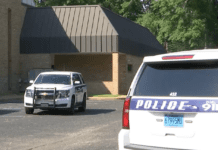“There’s no such thing as a Palestinian,” W. Boyd Bingham IV, the church’s associate pastor, says in the film, right after meeting a Palestinian Christian pastor who points out how damaging his beliefs have been to the Christian minority living in the occupied territories.
Religion News Service spoke to Zinshtein about her film and its reception. The following interview was edited for length and clarity.
How did you get interested in this subject?
The initial interest was about the involvement of Christian evangelicals. Most Israelis know nothing about Christian evangelicals. If anything, it’s “these Christians who love us.” It doesn’t go beyond that. I started looking into it in 2017. It was very clear the new American president was heavily backed by this community. My background is in journalism and I tried to find out where the wind was blowing.
After I started looking into it, I understood that (evangelicals are) a huge power that acts beneath the surface and most Israelis aren’t aware of it. And a big documentary has never been made on the subject. I wanted to look at the bond between Christians and Jews. It’s not only them reaching out to us. There are allies here on the Jewish side willing to work with them. Rabbi Yechiel Eckstein (the late founder of the International Fellowship of Christians and Jews) was one of the pioneers of that. But today it goes all the way up to the prime minister, who says evangelicals are our best friends in the world.
One of the first filming days we had was at Mar-a-Lago, where the IFCJ had their annual gala. You could see the power and connections there. We started to understand all these ties.
How did you find the Kentucky church?
It was through the fellowship. We asked them, who are your major supporters? The fellowship receives money mostly from individual donations. This church donated as a community and that made them one of the biggest donors. The church was here on their annual trip to Israel. We asked to join them for one day and we stayed during their whole trip. Two months later we landed in Kentucky.
One of the things the movie shows is how incredibly poor this region of Kentucky is, and yet they raise so much money for Israel. Did that bother anyone?
It raised additional questions about the role of faith. In Middlesboro, Kentucky, you’re in the hands of God or in the hands of the devil. There’s no middle. The church plays a crucial role in the community. When you’re there on the ground, you see the kids the church helps. When I left, I felt like I wouldn’t want to take one penny from these kids.
To what extent does the money raised by the IFJC and other nonprofits contribute to the expansion of settlements in the West Bank?
Most of the money comes from the state of Israel. The Christian money in the settlements is the cherry on top. The much greater support (Israel) receives is the political support — all the things that happened over the past four years by President Trump. The fact that (former Secretary of State) Mike Pompeo visited Israel and went to the settlements and said, “The settlements are not illegal per se” — that changed the whole policy of the United States toward the settlement project. That’s much bigger than any money evangelicals spend here. That’s huge. That legitimized them on the international arena.
One of the more moving parts of the film is when Boyd Bingham, the young evangelical pastor from Kentucky, visits a Palestinian Christian pastor in the West Bank who tries to tell him about the plight of the Palestinians. Did you arrange that meeting? How did that come about?
The church was on another trip to Israel. They were visiting Bethlehem and I asked (Bingham) to go (meet him). The reality is that the church travels in a bubble, without meeting actual Israelis and Palestinians. I was curious about a face-to-face meeting. I like Boyd (Bingham) a lot. It was interesting for me to see what would happen there.
What do you hope to convey about the movie and what kind of reception has it received?
In Israel, it was exactly what we hoped. It was broadcast on public TV here and received wide press coverage. The response of most people was, “Oh my God, we had no clue about it.” I think this bond shouldn’t happen behind the scenes. I wanted to bring this operation to light and to have a healthy conversation about it.
This article originally appeared here.











